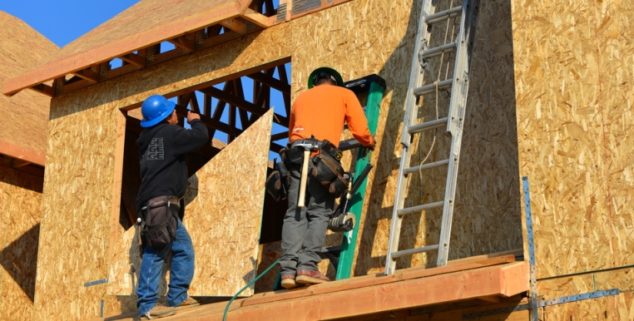Opinion
Dynamex ruling sparks confusion
 Workers in Bakersfield on the job during the construction
of a two-story home. (Photo: Richard Thornton, via Shutterstock)
Workers in Bakersfield on the job during the construction
of a two-story home. (Photo: Richard Thornton, via Shutterstock)A rare burst of spontaneous political combustion occurred earlier this year in Olympia, Washington, when hairstylists, barbers, and cosmetologists mobilized against a legislative bill that would have banned booth rentals, the practice by independent contractors of renting a chair or a station at a salon to make their living.
An online petition gathered an impressive number of signatures and together with emails, phone calls, and packing legislative hearing rooms, the state senator who wanted these freelance workers to obtain unemployment and workers’ compensation insurance from the state eventually backed down.
What’s going on here, in Washington state, and in every state in the nation has been a long and continuing battle to precisely define when an independent contractor really is independent and when he or she is in truth an employee.
Relatedly, here in California, Stormy Daniels, who turbocharged her notoriety by claiming an affair with President Donald Trump, took to the pages of the Los Angeles Times to pen an editorial on the perils facing strippers under a new legal dynamic.
“As independent contractors, we can perform when, where, how and for whom we want. If we are classified as employees, club managers would be empowered to dictate those conditions … Many dancers are raising kids, attending school, or engaged in some other demanding pursuit, and we need to be able to work when we want, where we want, making reliable money paid at the end of each shift. That’s the way it has always worked – until now in California, that is.”
What’s going on here, in Washington state, and in every state in the nation has been a long and continuing battle to precisely define when an independent contractor really is independent and when he or she is in truth an employee.
A year ago, on April 30, 2018, the California Supreme Court spoke loudly with its Dynamex decision. The court established an ABC test to resolve, or so it thought, the issue once and for all. The “B” part of the test, “that the worker performs work that is outside the usual course of the hiring entity’s business,” is at the nub of what has roiled – not calmed – California’s currently choppy business waters.
Two legislative measures circulating Sacramento seek to bring some badly need clarity to the Supreme Court’s Dynamex decision.
In an article for the Legal Center at NFIB, the nation’s largest small-business association, staff attorney Luke Wake writes, “… the opinion gave precious little guidance as to what constitutes the ‘usual course of business.’ Does this preclude a photographer from working with a makeup artist in a photoshoot? Does it preclude a magazine from treating a freelance photographer as a contractor? And is there liability for a retail shop renting out space to a florist?
While much of the Dynamex commentary has focused on the impact for the so called ‘gig economy,’ the reality is that Dynamex affects businesses of all shapes and sizes across industry lines. It’s bad enough that the California Supreme Court radically changed the playing field for the small business community. But, to make matters worse, at least one California court has ruled that the Dynamex rules should apply retroactively.”
Two legislative measures circulating Sacramento seek to bring some badly need clarity to the Supreme Court’s Dynamex decision. One, Assembly Bill 5, would, after giving a small handful of industries a safe harbor, codify into law much of the court’s decision—meaning, as much as 95 percent of small businesses would not be exempt.
Much better for peace of mind is Senate Bill 238, which would model California’s independent contractor test for wage-and-hour issues on the multi-factor economic realities test that is already used by the United State Department of Labor. It would benefit both employers and Workers across a broad range of industries by asking whether the worker is economically dependent on the hiring entity.
In anticipation of the problem California is now having, Arizona, a few years back, established a first-in-the-nation Declaration of Independent Business Status (DIBS) law allowing workers and businesses to create a legal presumption of a valid independent contractor relationship.
On April 10 of this year, Arizona Gov. Doug Ducey signed another first-in-the nation law allowing universal recognition of occupational licenses from other states. Prominent at the signing ceremony was a big U-Haul truck in recognition of the 100,000 people a year who have been moving to the small-business-welcoming Grand Canyon State. It’s a safe bet which state many of them are coming from.
—
Editor’s Note: John Kabateck is California state director for the National Federation of Independent Businesses, NFIB.
Want to see more stories like this? Sign up for The Roundup, the free daily newsletter about California politics from the editors of Capitol Weekly. Stay up to date on the news you need to know.
Sign up below, then look for a confirmation email in your inbox.

Leave a Reply